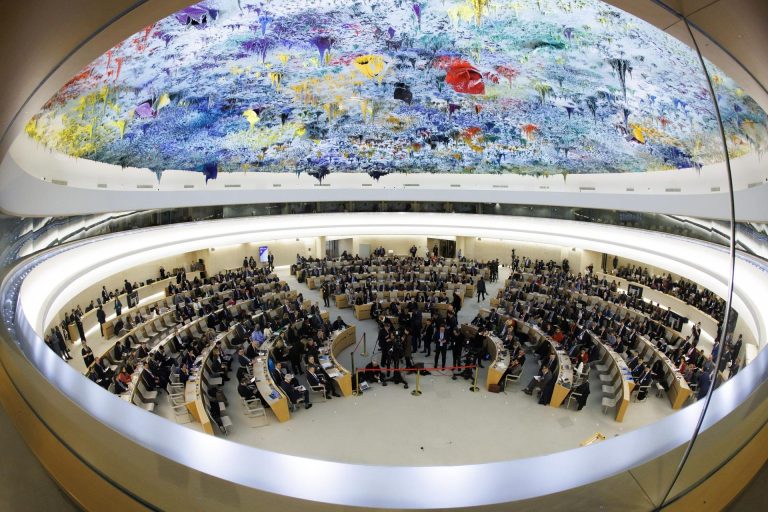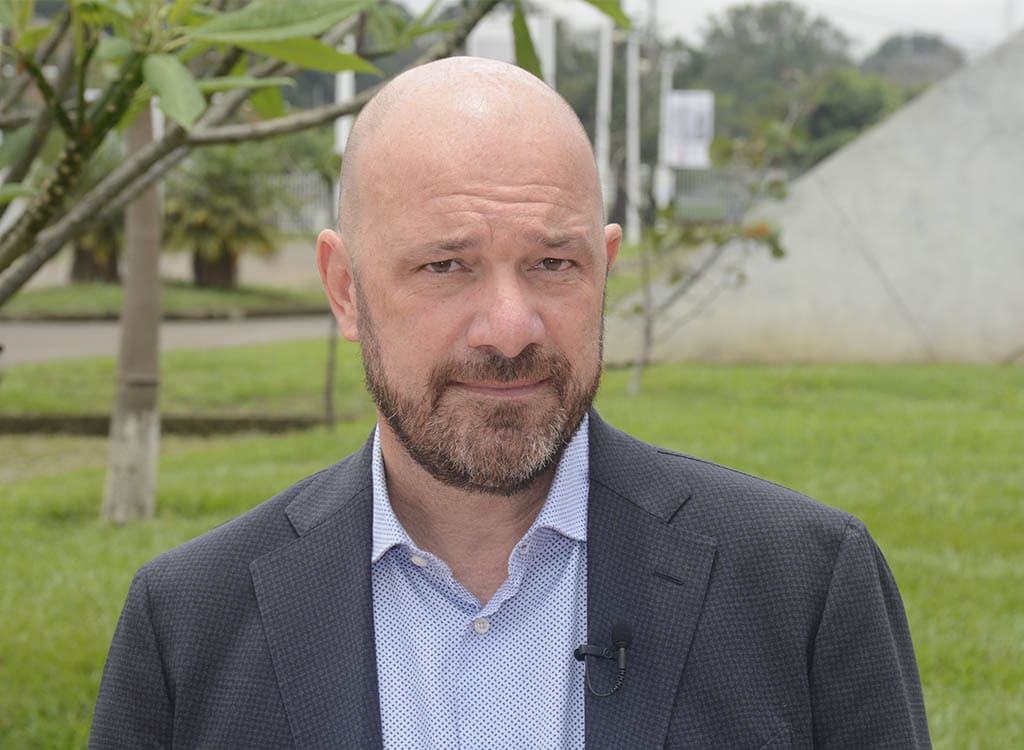27 de septiembre 2023

European Concern over Lack of Academic Freedom in Nicaragua

PUBLICIDAD 1M
PUBLICIDAD 4D
PUBLICIDAD 5D
Representative of Office of the United Nations High Commissioner for Human Rights highlights Brazil's role in the demand for human rights in Nicaragua

General view of the assembly during the high-level opening of the 52nd session of the Human Rights Council at the European headquarters of the United Nations in Geneva, Switzerland, Feb. 27, 2023. Photo: EFE
The constant wave of violence and restrictions exercised by the repressive apparatus of Daniel Ortega's dictatorship has put Nicaragua "at the center of international concerns", according to Alberto Brunori, representative for Central America of the Office of the United Nations High Commissioner for Human Rights.
"Every day, every month that goes by, the situation gets more complicated, because violations are accumulating and there is practically no way out. The formulas of repression seem to be expanding, and broadening, but how far? How far do they intend to go with these formulas of limitation of freedoms?", asked Brunori, in an interview for the program Esta Semana broadcast on YouTube this Sunday, September 24, 2023.
The specialist pointed out that there is a clear consensus among the international community on the seriousness of the human rights crisis and violation of constitutional guarantees in Nicaragua, even in those countries that do not openly condemn the Ortega regime.
"What has been important is that it seems to me that no one has doubted that our findings indicate that there have been cases of torture, that there are arbitrary detentions, that more than 3,000 NGOs have been closed, there are elements that cannot, just like that, be disqualified," said Brunori.
The Office of the UN High Commissioner for Human Rights presented a new report on the situation in Nicaragua. What are the main conclusions of this report?
The report presented by the High Commissioner presents some extremely worrying scenarios, in particular a situation of progressive deterioration of conditions, in the civic space, with the closure of more than 2,000 civil organizations since August of last year, up to the period of the report's closing.
In addition, several things have happened, such as the banishment of the 222 people arbitrarily detained, plus another 70 or so who have been practically reduced to civilian death. Twelve universities have been closed, among them the UCA, which has a great intellectual tradition throughout Central America. The UCA is accused of being a center of terrorism, which is frankly hard to believe. On top of that, of course, is the situation of Monsignor (Rolando) Álvarez, who is still in detention. There are a series of circumstances that we say are of extreme concern and that we have had to describe and raise, including the methods of possible torture of the detainees, which we continue to investigate.
What has changed since the last report?
There has been a new wave of violence and restrictions in civic space. Every week, every month that goes by, the situation becomes more complicated, because the violations are accumulating and there is practically no way out. The formulas of repression seem to be widening, broadening, but how far are they going to go with these formulas of limitation of liberties? Then the rule of law, as we have been pointing out for some time now, is under attack, with practically all the powers being State controlled, including local power. Any dissident voice ends up falling into the crosshairs of the repressive institutions of the State.
How do you gauge the reaction of the international community at the UN Human Rights Council to the situation in Nicaragua as described by the High Commissioner?
I believe that there has been a positive acceptance and appreciation by many Member States of the High Commissioner of the work done by his office. I think it has been positive. There have also been dissenting voices in relation to the work done. But even the dissenting voices have not challenged the facts, and the facts speak for themselves. This seems to me to be a central point. The methodology we use is a proven methodology that we use in every country in the world. So, of course it is fair, it is legitimate. What has been important is that it seems to me that nobody has questioned when we say that our findings indicate there have been cases of torture, there are arbitrary detentions, more than 3,000 NGOs have been closed, there are elements that cannot be disqualified. I believe that this has been very clear in the Council debate and very clear in the interventions of many Member States. I repeat, discussion and debate are admitted and respected.
Brazil recently joined an initiative of countries at the UN to question the human rights violations of the Nicaraguan regime. What is the objective of this group and what actions have they taken so far?
Brazil has always been part of the group, it is called the Core Group, which is the group that monitors the situation of Nicaragua in the Human Rights Council. It seems to me that the intervention and contribution of Brazil, which is part of this group, has been important, because apart from being aware of the violations and even the statement made by Chile on behalf of the group of countries, it refers specifically to the UCA and other violations. And this contribution seems important to me because it once again requests access to be granted the Inter-American Commission and to the Office of the High Commissioner, and for a dialogue. Why does this seem important to me? Because Nicaragua's isolation is becoming more and more pronounced. Nicaragua basically does not attend the committees, it has no relationship with the office, etcetera. It is not a positive sign for any country, because interactive dialogue with the international community is part of what is expected of a democratic state under the rule of law.

Is it possible that because of this latest report by the Office of the High Commissioner, which undoubtedly demonstrates the serious situation of human rights violations in Nicaragua, more countries will join the international condemnation?
The facts described in our reports are intended to be widely known and to be acted upon as deemed appropriate by the Member States. Of course, the international pressure also goes in the direction of requesting -as the High Commissioner has said in the Council- a dialogue, an opening, that the country resumes dialogue with the High Commissioner's office, because that is the only way forward. I think it would be an especially important gesture on the part of the Nicaraguan Government to approach the High Commissioner, who has opened the door several times. The previous High Commissioner, Michelle Bachelet, opened the door for dialogue, and the current High Commissioner, Volker Türk, is also doing so.
Do you think there is enough pressure on the Nicaraguan government to allow UN human rights experts to enter the country?
The pressure is considerable and there have been two resolutions in the Council. I believe that the debate among the countries shows that there is concern. Subsequently, the formulas can be discussed. But there can be no doubt that Nicaragua is at the center of international concerns, as the Secretary General and the High Commissioner have said. We believe that through the pressure exerted by the Office and other agencies, it will indeed be possible to achieve the opening of this dialogue. There is no other way. Sooner or later, this will happen, we have seen it in history in different countries. The sooner there are fewer violations, the better a society can be rebuilt based on the rule of law and on a human rights agenda which is shared by a good part of Nicaraguan society.
What are the consequences of the Nicaraguan regime's refusal?
The international image of a country is highly deteriorated because the showcase of the countries, among other things, is the Human Rights Council and the attention in their response to the committees. So, if that is the showcase and a country does not even appear in the showcase, that country is left with a very negative image, and that is not good for investments, nor for the sustainability of projects and programs, which are harmed by the image of a country and the country ends up sinking deeper and deeper into isolation.
In Nicaragua there is no access to justice, what can victims of repression and democratic countries do to facilitate bridges of access to justice.
Access to justice is limited because state institutions are blocked. It seems to us that the justice system is failing to provide justice and is, rather, guaranteeing impunity. So, for the moment I believe there is no justice possible for serious human rights violations, at least in Nicaragua. It seems to me that it is necessary for the victims to continue using the instruments that exist in the system of nations, such as those offered by the universal protection agencies. States -when they consider it appropriate- can resort to universal justice. That is, open cases for serious human rights violations in the courts of other countries. Of course, violations cannot go unpunished, they will not go unpunished. History teaches us that today, tomorrow or the day after, justice always comes.
What does the Office of the High Commissioner intend to do now in the face of the worsening human rights crisis in Nicaragua?
The Office has on behalf of the Human Rights Council, a strengthened mandate to monitor the human rights situation. The same Council, in parallel, has created a group of experts to identify responsibilities in human rights violations from 2018 to date. We are going to continue along these lines. We are emphasizing violations, not only the most notorious, but the implications these violations have, for example, on women's rights, sexual and reproductive rights. These violations affect not only society in general, but also women in terms of their sexual and reproductive rights. And so, we will continue with issues such as freedom of religion, for example, to continue to open space in the Council and at the international level to make the violations known, and to document the cases.
This article was originally published in Spanish in Confidencial and translated by our staff.
PUBLICIDAD 3M
Confidencial es un diario digital nicaragüense, de formato multimedia, fundado por Carlos F. Chamorro en junio de 1996. Inició como un semanario impreso y hoy es un medio de referencia regional con información, análisis, entrevistas, perfiles, reportajes e investigaciones sobre Nicaragua, informando desde el exilio por la persecución política de la dictadura de Daniel Ortega y Rosario Murillo.
PUBLICIDAD 3D